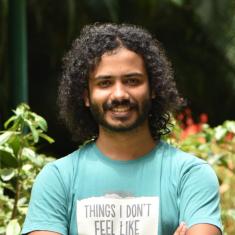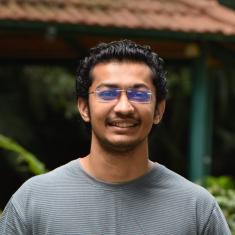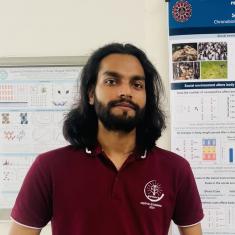Students
Students

Surajit Dawn pursuing Ph.D.
I work on a unique set of fruit fly populations which are being reared in a semi-natural outdoor environment for many years now and we aim to understand how circadian rhythms evolve in such complex natural zeitgeber system, compared to the simple Light-Dark cycles of the laboratory environment.

Kamakshi Tomar pursuing Integrated Ph.D
Huntington's Disease (HD) is a neurodegenerative condition that impacts not only brain but the whole body as well. It has no known cure yet. Disease management strategies that could improve patients' healthspan and are easy to implement are crucial. One such approach is Time Restricted Feeding (TRF) which is useful in combating obesity and other cardiometabolic diseases. Recently it has found a home in improving brain health and thus combating neurodegenerative conditions as well. However, the mechanism behind these regimes is yet to be explored. I am interested in exploring the utility and mechanism behind TRF when implemented against HD by utilizing Drosophila as a model organism.

Neeti Badigannavar pursuing Ph.D.
I work on chronotype populations- Early and Late; of Drosophila melanogaster, which have been selected for divergent timing of eclosion and their expression profiles across various times of the day. I am looking at how temperature and its fluctuations influence the clock and the rhythms controlled by it. Based on this information I want to understand how different chronotypes respond to temperature fluctuations and incorporate that information. Apart from this, I am also interested in looking at how clock influences the aging.

Rupareliya Vimal Pravinbhai pursuing Ph.D.
Huntington’s disease (HD) is a monogenic, adult-onset, fatal neurodegenerative disorder having characteristic motor, cognitive and psychiatric symptoms. In recent years, sleep and circadian rhythm disruptions have been considered important symptoms and appear years before the manifestation of typical motor dysfunction. Normal sleep and circadian system are vital as their disruption causes cognitive decline, mood disorders and reduction in lifespan in many organisms. Hence, these abnormalities are speculated to drive the disease pathology in HD. However, this relationship is not well-studied. I am interested in developing and characterizing a milder model of HD in Drosophila. Further, different sleep deprivation and induction methods will be used to assess its effect on disease progression.

Soumyadeep Dey pursuing Integrated Ph.D
I am interested in studying the mechanisms behind perception of the social environment and its effects on different fitness related traits such as body weight in Drosophila melanogaster. I am exploring the different sensory modalities that enable perception of social cues by which body weight is being changed in response and later the neuronal substrates by which such sensory information is processed in the fly brain.

Utkarsh Pandey pursuing Integrated Ph.D
I am currently working on my MS thesis which deals with differences that conspecific presence has on lifetime reproductive output in Drosophila, which has been shown in the lab. I am exploring one of the possible reasons behind it, i.e. whether flies manage stored sperm differently when conspecifics are around or not, resulting in fitness benefits or costs in terms of progeny produced.

Pritiben Pankajbhai Prajapati pursuing Ph.D.
Drosophila melanogaster possesses well-characterized circadian pacemaker neurons that regulate various aspects of circadian behavior. They are known to communicate via a variety of chemical neurotransmitters and neuropeptides. My study aims to investigate the possible roles of electrical synapses in circadian rhythms. I aim to explore neuron-neuron, glial-glial and neuron-glia interactions via gap junctions and hemichannels. By utilizing genetic tools to modify expression of Innexin genes – which code for gap junction proteins, we seek to uncover their contributions to the modulation of circadian behavior in fruit flies.
© 2021, JNCASR, Jakkur, Bangalore, India
